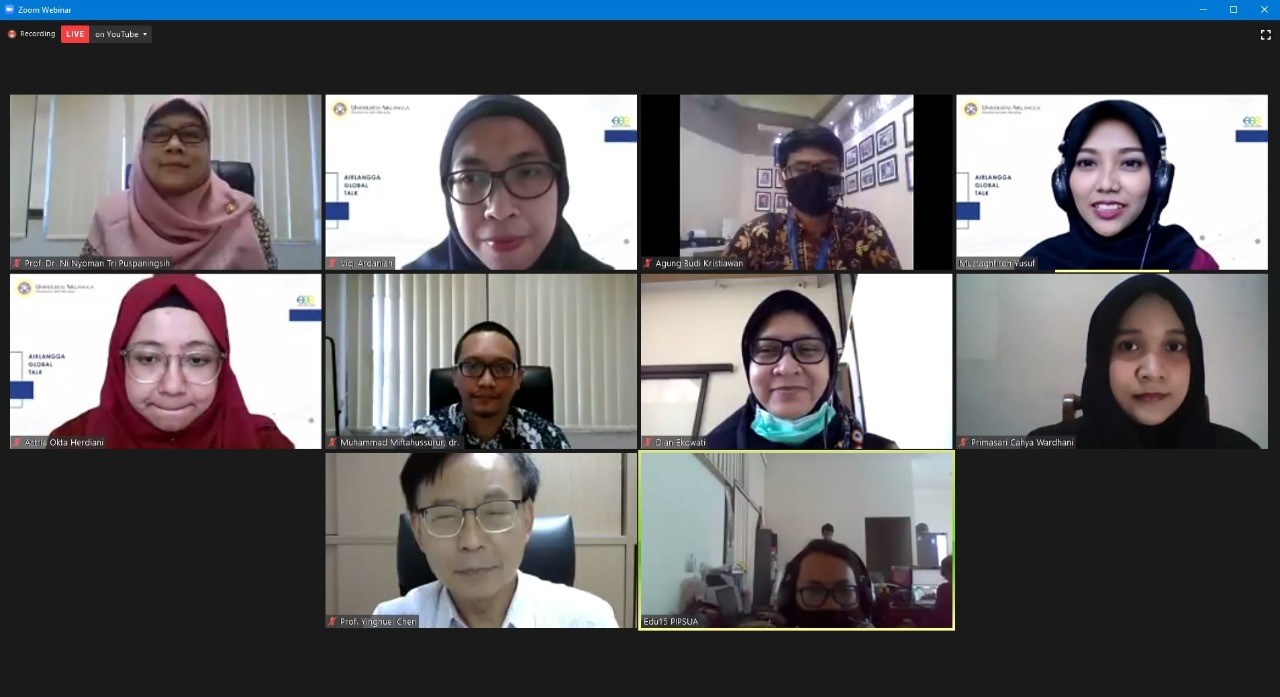UNAIR NEWS – Coronavirus has changed the way of life. Health issues, economic depression, and also the education system are becoming everybody’s concern nowadays. Campus has been closed, sit in class has been switched into online method, and a vast of students are struggle on the learning process.
In this case, international students must experience this situation far away from their home without an accompany from their family due to the subsequent nationwide lockdown. In responding to this matter, universities are doing their best to support international students to get through this crisis.
Thus, Airlangga Global Engagement (AGE), Universitas Airlangga (UNAIR) organized a webinar entitled “Providing Excellent Service for International Students during Pandemic”. This webinar aimed to share universities’ actions and regulations to ensure the students’ welfare from corona virus issues and the teaching and learning process runs well.
The webinar was held on 14 September 2020 by inviting four speakers from Universitas Airlangga as the host, Asia University, Center of Partnership: American Corner and Taiwan Education Center, Surabaya, Indonesia. They were:
1. Prof. Ying-Huei Chen, Dean of International College, Asia University, Taiwan
2. Prof. Dr. Ni Nyoman Tri Puspaningsih, M.Si, Vice rector for Academic, Student and Alumni Affairs, Universitas Airlangga
3. Primasari Cahya Wardhani, M.Sc., Manager of Taiwan Education Center Surabaya Indonesia (TECSID)
4. Agung Budi Kristiawan., S.Sos., S.A, Representative of American Corner, Public Relations of Library, Universitas Airlangga (UNAIR)
Moderated by Ms. Viqi Ardaniah, a Regional Ambassador for Taiwan, this webinar conducted in two sessions. Firstly, it discussed the University’s policies on international students’ welfare during the pandemic. Secondly, it talked about best practices from the Center of Partnerships at Universitas Airlangga. This event was held via Zoom Meetings and over 100 participants from various countries such as Australia, Brunei Darussalam, Indonesia, Malaysia, Russia, Singapore and Taiwan, attended the webinar.
In this health crisis, both Asia University and Universitas Airlangga implements health protocols and regulate the number of students to enter the campus. According to Prof. Ying-Huei Chen, providing transparent information about coronavirus was important in order to gain students’ trust towards university. Also, there were 3 types of health management at the Asia University which applied for their students, they were self-management of health, home quarantine and home isolation.
In addition, Prof. Ni Nyoman Tri Puspaningsih stated that Universitas Airlangga had emergency responses since 2 March 2020 by implementing several actions such as assisting ongoing international students for medical check-up, sharing official guidance of coronavirus alert, distributing travel tracing survey, and providing health package aid for international students. In order to support students’ research, Universitas Airlangga allowed the students to use university laboratories as long as they obey health protocols entering the campus.
As the university’s policy, Centers of Partnership in Universitas Airlangga conducted a number of online programs. During the pandemic, TECSID held several programs such as Taiwan Higher Education Fair Online, info and sharing session about study and scholarship in Taiwan, personal consultation, orientation for new students, and also Mandarin teacher training and workshop
Meanwhile, American Corner also organized interesting programs for students such as English learning, alumni activities, Education USA, and also culture and information about the USA. Both centers are very active in using social medias to reach the students, moreover, during this challenging situation.
Overall, universities concerned to this current situation by addressing a broad array of health and academic policies issues in order to maintain academic activity including teaching, learning and research process. These actions are used to assist the government in preventing the spread of coronavirus, so that academicians can continue their activities normally in the near future.
Editor: Binti Q. Masruroh





